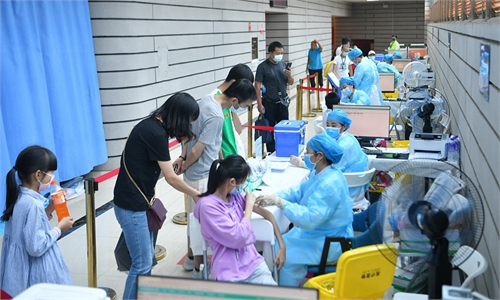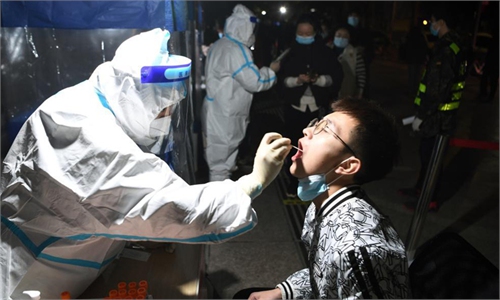
Tourists enjoy the autumn scenery on a plank road in Longtoushan scenic area in Hanzhong, northwest China's Shaanxi Province, Oct. 28, 2021. (Xinhua/Tao Ming)
The Chinese tourism industry in the third quarter took the hardest hit since 2020, due to strict epidemic prevention and control measures following recent COVID-19 outbreaks, including the suspension of trans-provincial travel in many parts of epidemic-hit provinces, businesses and industry analysts said on Tuesday, with some estimating a decline of more than 10 percent in tourism in the quarter.
As of October 31, at least 27 major listed companies in the tourism and hotel industry had released third-quarter results. More than half reported net losses and over 60 percent posted a year-on-year decline in earnings, driven by the impact of sporadic COVID-19 outbreaks over the summer, according to new reports on Monday.
The number of tourist arrivals in the third quarter fell by more than 10 percent, a relatively serious result since last year, an industry insider told the Global Times on Tuesday on condition of anonymity.
"The second half of this year is definitely not optimistic, and it will be weaker than the first half, given the tight epidemic prevention and control work in various places," the person said.
From January to October 2020, there were 22,794 travel agencies in China, but the number dropped in 2021 to 20,892, a decrease of about 8 percent, as licenses were canceled or revoked, data from online business index platform Qichacha showed.
Li Lin, an employee with a Beijing-based travel agency, said that the recent sales performance was not optimistic, especially in October, when the National Day holidays were expected to be the last peak travel time this year before the off-season dawns in winter.
"But over 60 percent of the trans-provincial orders were canceled in October alone after the tightened epidemic prevention measures," Li said, adding that the moves were understandable due to the epidemic spreading in various places in the country.
Some large domestic tourism agencies such as Guilin Tourism Corp also faced losses. The company said that in the third quarter, its operating income fell 13.2 percent year-on-year to 65.45 million yuan ($10.23 million), and it posted a net loss of 34.05 million yuan.
But not all industry players felt the impact. A general manager with a five-star international hotel in South China's Guangdong Province told the Global Times on Tuesday that business in the third quarter was slightly better than last year, because the facility mostly caters to business travelers and not tourists.
Since October this year, there have been multiple local outbreaks, involving 11 provinces within a week.
In response, the Ministry of Culture and Tourism issued an emergency notice on October 23, requiring strict implementation of the "circuit breaker" mechanism for the management of inter-provincial tourism operations.
For provinces and cities, where there are high-risk areas, travel agencies and online travel sites must suspend all cross-provincial group tours, as well as air tickets and hotel package services in the region, media reports said.
"The performance in the third quarter was not only the current pressure of epidemic resurgences but the overall response to persistent pressure," Yang Jinsong, a senior expert with the China Tourism Academy, told the Global Times on Tuesday.
But Yang said that the situation is temporary and there is no need to be too pessimistic, since epidemic prevention will mean safer travel flows, and the market will surely rebound, Yang said.



